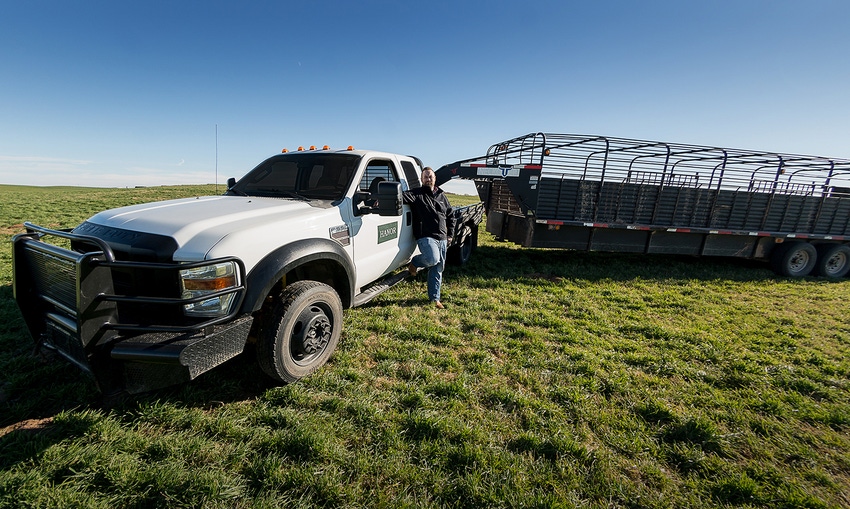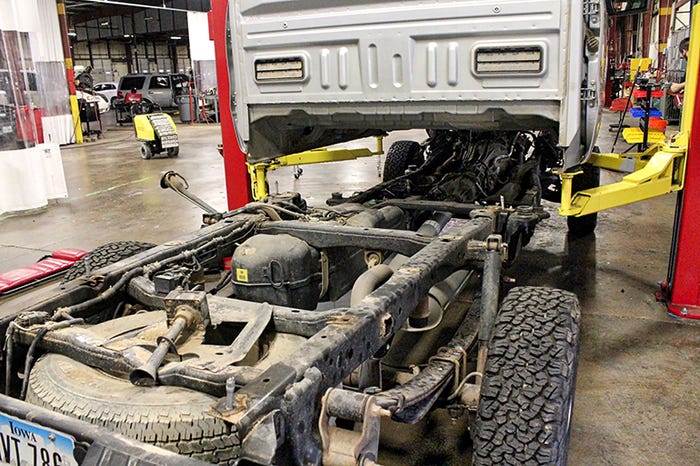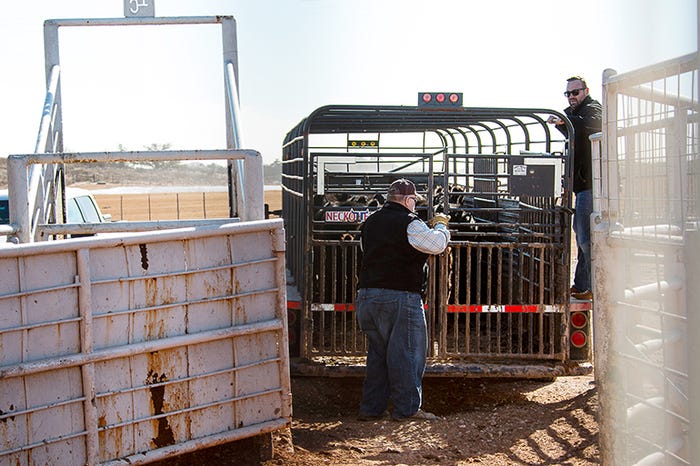Hanor operates more than 750 farms across seven states. Vehicle uptime is crucial to move between farms and ensure the well-being of the pigs.
July 2, 2019

By Joe Hanneman
Brandon Mortenson had a dilemma. His company’s rapid growth was putting extra pressure on its fleet of high-mileage pickup trucks. He needed a strategy to keep up with demand without breaking the bank.
“What we ran into was we’re hiring and growing so fast that we needed to come up with a solution,” says Mortenson, fleet manager for the Hanor Co., the 12th largest pork producer in the United States. “We’re not comfortable going out and buying used fleet trucks with 100,000 miles on them. You just don’t know what they’ve been through. At least with our fleet, they’re high-mileage, but we know they’ve been well maintained. That’s where ‘reman’ came in.”
“Reman” refers to complete vehicle remanufacturing, an emerging trend in commercial vehicle markets. By diverting some of the aging truck fleet to be remanufactured rather than buying new vehicles, Hanor found that “reman” gave the Oklahoma-based company the same quality as new trucks, but saved more than 40% off the cost. Adopting remanufacturing has been a game-changer for their nearly 200-unit fleet.
For “reman,” Mortenson turned to Vehicle Reman LLC of Tyler, Texas, the nation’s only company dedicated to remanufacturing commercial Class 1-5 trucks, vans, sport utility vehicles and specialty vehicles. Vehicle Reman took an initial Ford F-150, F-550 and Chevrolet Silverado 1500 from Hanor’s fleet and put them through a comprehensive 10-step remanufacturing process at its 60,000-square-foot Texas facility. The F-150 was 3-years-old with 194,000 miles; the F-550 was 9-years-old with 120,000 miles. Hanor got back two same-as-new trucks with three-year unlimited mileage powertrain warranties. The savings: about $50,000.
During the “reman” process, Hanor’s trucks were disassembled down to the frames and all systems inspected for wear, damage and defects. Wherever needed, same-as-new remanufactured components and systems were installed, including a new Ford gasoline engine for the F-150, a “reman” Ford Power Stroke diesel engine for the F-550 and a “reman” engine, transfer case and transmission for the Silverado. All remanufactured parts and components are certified to the original manufacturer’s specifications. The F-550 needed body work and the flatbed was brought back to like-new condition from very rough shape.
“All in all, I had high expectations and they met them,” Mortenson says of Vehicle Reman. “Every step of the way they were very professional. They didn’t over-hype themselves. They said they can do this; it will look like this — and that’s what they did. I really, really liked that about them.”

Hanor is among the businesses on the leading edge of a trend toward complete vehicle remanufacturing. The high cost of new vehicles has created demand for more fleet options. Reman has almost unlimited potential to give fleet owners more buying power and options for end-of-life vehicles, experts say.
“This is a natural evolution of well-established automotive parts remanufacturing, but applied to the whole vehicle,” says Greig Latham, founder and managing director of Vehicle Reman. “We have a proven system that can remanufacture a truck, van or other vehicle in as little as 48 hours. When customers see the same-as-new quality and remarkable savings, ‘reman’ really sells itself. The main challenge for us is many fleet buyers don’t yet know about ‘reman’ and what it can do.”
Steve Belden, director of sales and marketing for Vehicle Reman, says remanufacturing has the potential to be a $1 billion annual business for the Texas company. “The savings from ‘reman’ make our customers more competitive and poised for growth,” Belden says. “Those who incorporate ‘reman’ into their fleet-management strategy find it easier to gauge, reduce and manage total life-cycle costs. They are able to obtain like-new quality even when the budget doesn’t allow for purchasing new trucks. That’s a huge win for any company.”
Reman vehicles are engineered to order, Belden says, so it’s easy for customers to upfit or obtain specialty equipment for law enforcement, rescue or transit purposes. The company has a smartphone app that enables customers to submit vehicle information and get a quick quote for a remanufactured vehicle. An ideal “reman” candidate is a Ford, Chevrolet or Dodge, around 7-years-old with more than 100,000 miles in service. Vehicles as old as 20 years can undergo the “reman” process, Belden says.

Mortenson says he recalls seeing something about Vehicle Reman on a Saturday morning automotive television program. That’s what prompted him to look into “reman” for his fleet. “I kept running into these problems with how to keep up with the fleet,” he says. “I finally downloaded their app and sent some photos over to them. They got with me within an hour and were very helpful and made the decision very easy. That app is very easy to use. I’ve sent probably half a dozen requests for quotes through the app. It’s very straightforward, very convenient.”
Hanor operates more than 750 farms across seven states. Because they deal with live animals, vehicle uptime is crucial to ensure employees can move between farms and ensure the well-being of the pigs. Truck usage varies depending on the location. “Depending on the state, the wear and tear is different,” Mortenson says. “In Oklahoma I can give a brand-new truck to an employee at our west ranch — it’s 7,000 acres and there’s 27,000 sows out there — and that truck may never see a paved road in a 12-month period. It may go that long without seeing anything but gravel or sand.”
Mortenson says his fleet strategy starts with quality trucks, typically Fords or Chevys. Ford F-Series trucks are preferable in Iowa and Wisconsin, he says, due to the rust-inhibiting aluminum construction. The company has an aggressive preventive maintenance program with regular oil changes and comprehensive inspections. The highway-mile trucks from Iowa get sent to other Hanor locations at about 150,000 miles. After a few more years of service, they had typically gone to scrap. But now many of them will go through the remanufacturing process.
“Our high-mileage fleet up in Iowa we try to keep for four years, five years before we retire them and make them viable for the Vehicle Reman program,” Mortenson says. He expects to be sending at least six trucks a year to Texas for remanufacturing.
Belden says vehicle remanufacturing is about even more than a lower purchase price or impressive environmental benefits. “Reman trucks and other vehicles incorporate improvements in fuel efficiency, ride and reduced cab noise,” he says. “Fleet managers no longer have to worry about anticipated repair costs near end of life. Fleet owners have new depreciation options based on the value of the remanufactured vehicle. ‘Reman’ is definitely a process whose time has come.”
Hanor’s Mortenson could not agree more. “So far we’ve put 36,000 miles on that F-150 since it was remanufactured earlier this year,” he says. “No problems whatsoever. We change the oil and put gas in it.”
You May Also Like



